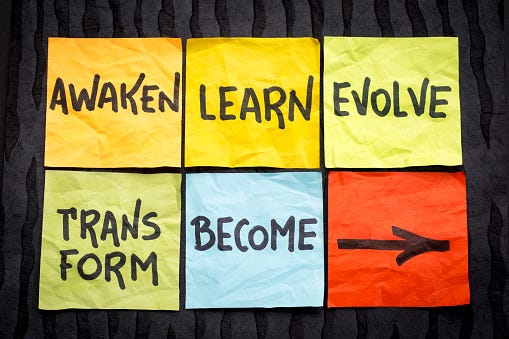The Science of Big Data and the Missing Data Points?
A step by step exploration of human progress in lifehacking and problem-solving
“This newsletter serves a demographic of highly intelligent readers, and deep thinkers with a passion for ideas, critical thinking, and a desire to understand the world around them. Readers of my posts are usually tired of being patronized elsewhere by fact-less, opinionated know-nothings, misinformation, conspiracy theories, and fake news.
“Knowledge is power, wisdom brings meaning, contentment, and happiness!”
——————————————————————————————————————
On a personal note: Please excuse grammatical errors, typos, repetition, and any general nonsense, and such in this post. I am getting a bit older now, and I have about 20,000 pages of information that must get published before I leave the mortal coil. I simply write and publish more than my humble editors are able to correct. If you find enough errors you are welcome to contact me about being an editor of my work.
Thanks for sharing this newsletter with your friends and associates - Join us for daily tips on personal development at our free Self-Improvement for Beginners Group and Forum
Click Below or cut and paste the URL to Join
https://www.facebook.com/groups/455029215769173
———————————————————
A 5 Minute Read
Lewis, there is so much information out there. It can all be overwhelming. In making decisions, I am always a little concerned that I am going to make a poor choice because I missed or ignored an important data point. How do you avoid making these mistakes?
A. When people ask what I do, I usually explain with a Mona Lisa smile that I am a Big Data Life Hacker, meaning that I gather as much data and resources as possible and then apply all this to solving any problem. Being a results-oriented, and peak performance life coach, this data usually provides tricks, shortcuts, strategies, tactics, tools, and methods to increase productivity and efficiency, in all walks of life.
In this sense, there never is any missing data because there never is any one best way to solve a problem. The solution (s) will vary based on the person needing the solution, their abilities, resources, skills, clarity of thought, time available, emotional clarity, etc.
The question posed here, about missing data points reminded me of a wonderful article I once read about how humans advanced their knowledge and used various hacks and tools over millions of years.
Here is that article:
https://qz.com/africa/2110046/africas-prehistoric-technological-advances-changed-the-world/?utm_source=email&utm_medium=daily-brief&utm_content=9564f185-6f93-11ec-9acc-4aae4b29dbd1
Once we surrender the idea that we may be missing some important or “missing data” we focus on gathering or sharing strategies or techniques adopted in order to manage one's time and daily activities in a more efficient way. Essentially it is a merging of systematic thrift, collaboration, and frugality merged with time management and priority planning.
“Without big data analytics, companies are blind and deaf, wandering out onto the web like deer on a freeway.”
Geoffrey Moore, author and consultant)
The system I created and teach to master these skills is called Harrison’s Applied Game Theory (HAGT). HAGT is a system of strategizing to maximize one’s potential at the lowest possible cost. These game strategies are often created as a response to a competitive situation where a player in the game of life is faced with complex challenges, obstacles, and constraints. Applied game thinking is a strongly influenced and loosely applied take on Game Theory that has garnered researchers over a dozen Noble Prizes. With the lifehacks in these newsletters and applied game thinking as a foundation, you will be able to troubleshoot virtually any problem.
The information in these newsletters has been tried and tested daily in my own life. My goal in creating this newsletter is in helping you to save, money, save time and create a happier more purposeful life.
It is my experience that there are certain qualities that define virtually all human behavior. One of these qualities is to strategize ways to maximize our untapped potential and do so at the lowest possible physical, emotional and economic cost, especially when interacting with other people.
To a young millennial this is nothing more than a lifehack. To me, it is more accurately described as a lifehack game because game thinking is the most effective, efficient, and productive way to achieve this goal. Looking for a shortcut is one thing; doing this by mimicking the thought and behavior patterns we exhibit when playing a game is something else altogether.
One way to view these human thought and behavior patterns are, as a game. In such a game the more one who prospers at the lowest possible cost to themselves and others wins. Prospering does not need to be defined in financial or material terms. It can relate to emotional well-being, clarity of thought, service to others, and many other ways.
Much of life is driven by sets of ideas and numbers that describe the past, present, or future states of things, particularly strategic interactions between two or more individuals or groups (players) in situations containing set rules and outcomes. Game theory is the process of observing these interactions and modeling them to make effective decisions. My approach to game thinking is a simplification of these ideas.
In life, we often model or copy what we have seen or experienced before. This process is known as modeling among game thinkers. Modeling strategies in this way is not about solving problems as much as it is about applications and solutions.
In an ideal world, game theory and game thinking would be a waste of time. The extraordinary person would simply do what Lao Tzu, the great Chinese–Taoist Sage did. Once he realized that most people were just clueless, and would never get “It”, he left town, went to a mountain community with a gatekeeper, and hung out with all the other, wise men and women, visionaries, and sages. There they could all live their lives motivated by love, emotional balance, clarity of thought, compassion, and personal contentment. Visionary thinkers of this type have no interest in living a zero-sum, win/lose life motivated by anger, greed, lust, vanity, attachment, and ego. The type of thinking that seems to motivate many.
The life hacker, Prepper, Survivalist, or any individual committed to simple intentional living, appreciates the power of barter, repurposing what we have, creativity, innovation, repair cafes, thrift stores, and collaborative thinking to live an abundant, affordable and purposeful life. In the end, there is no missing data, only found data.
—————————————————
If you want to live a struggle-free life, filled with knowledge and wisdom, you can do so by becoming a master life hacker. Learn more about thisby exploring my course Winning the Game of Life: Lewis Harrison’s Life Strategies Playbook Method from A-Z.
Click on the button just below or copy and paste the link to learn more about the course …
——————————————————
None of us can progress alone, without some skilled guidance. Are you looking for a mentor or a compassionate, results-oriented life coach? This would be a great gift to give yourself.
I’d love to work with you and help you to get to your “best life.”
Let's schedule a 15-minute interview to determine how I can help you create a customized and personalized program for creating your best life. Email me at LewisCoaches@gmail.com
Lewis
LikeCommentShare









